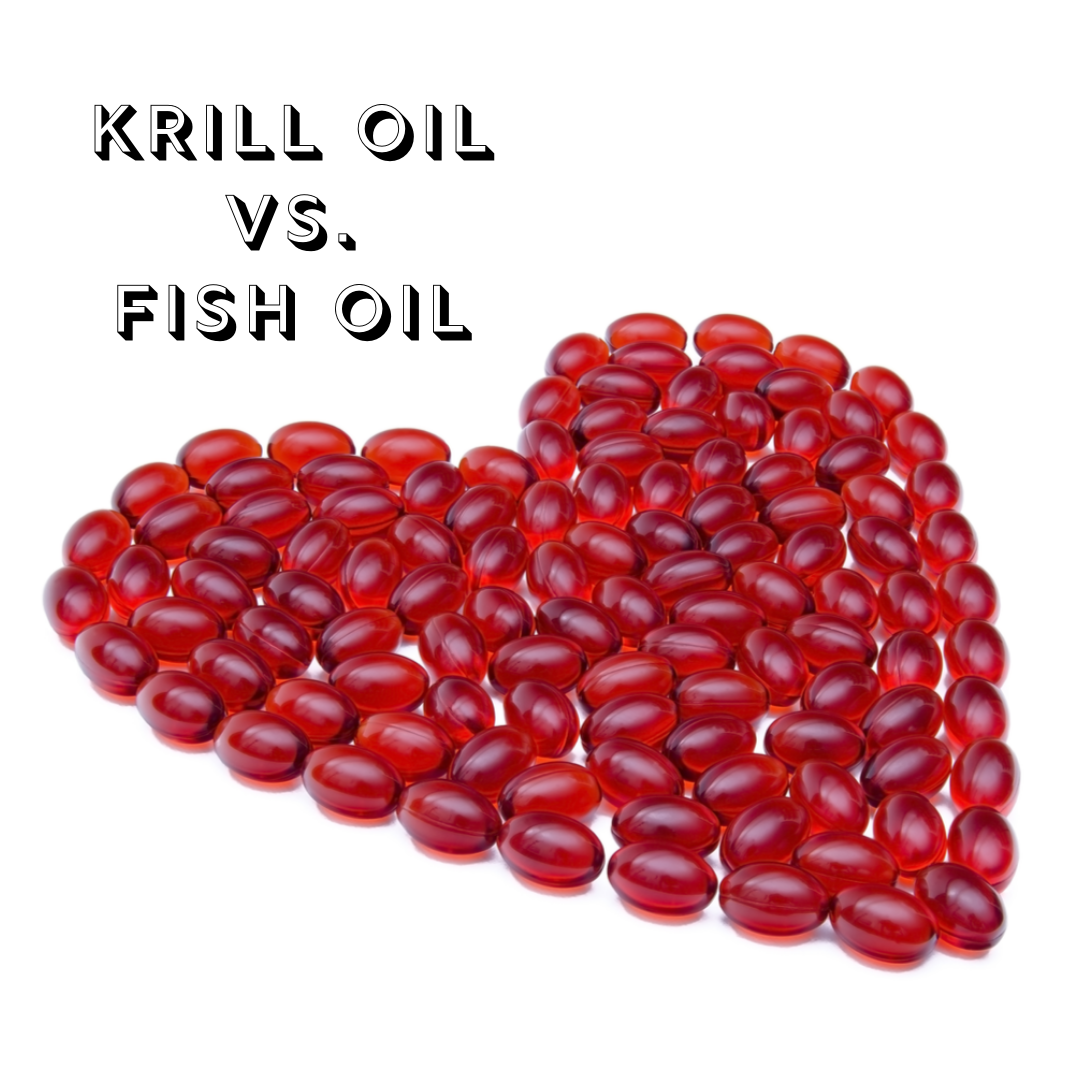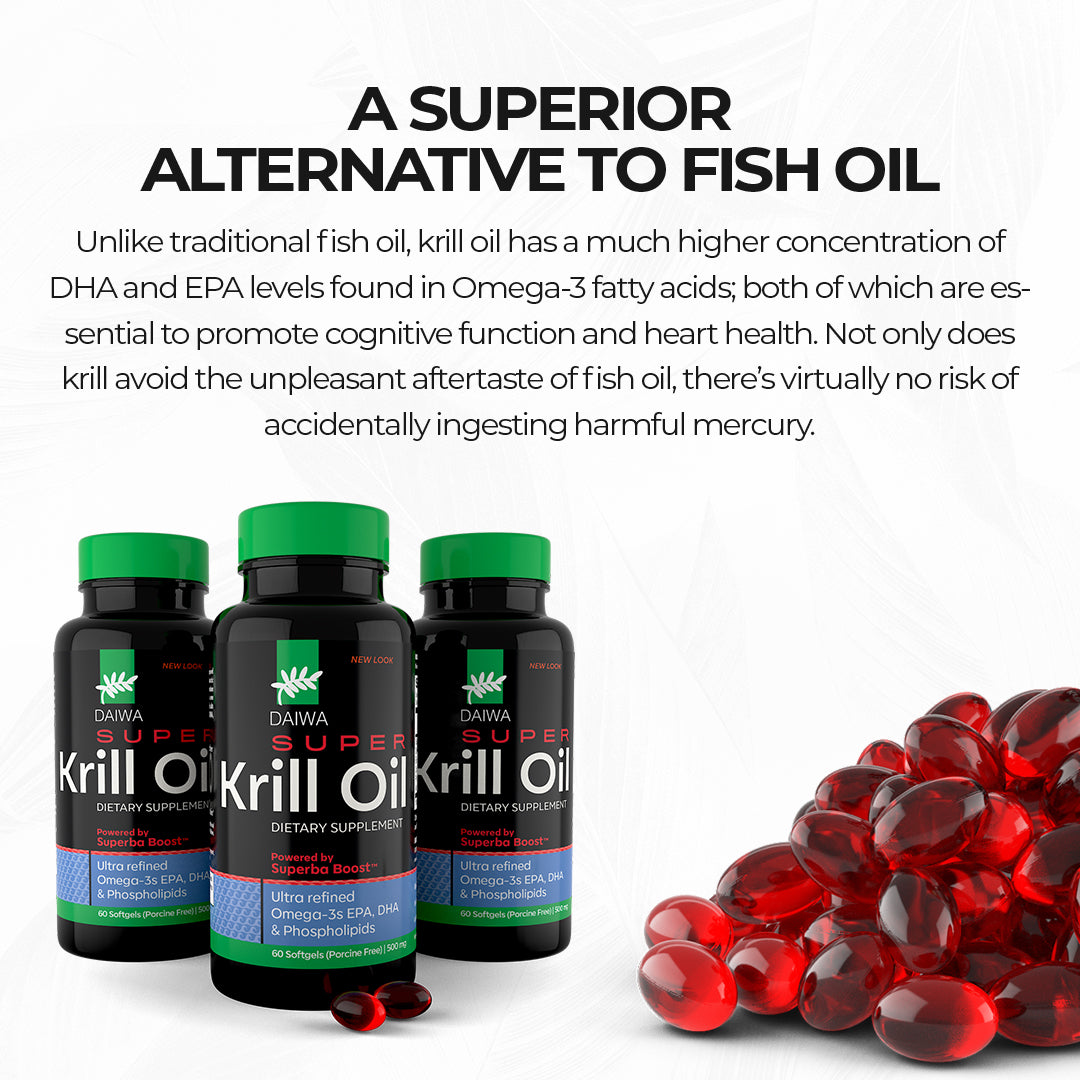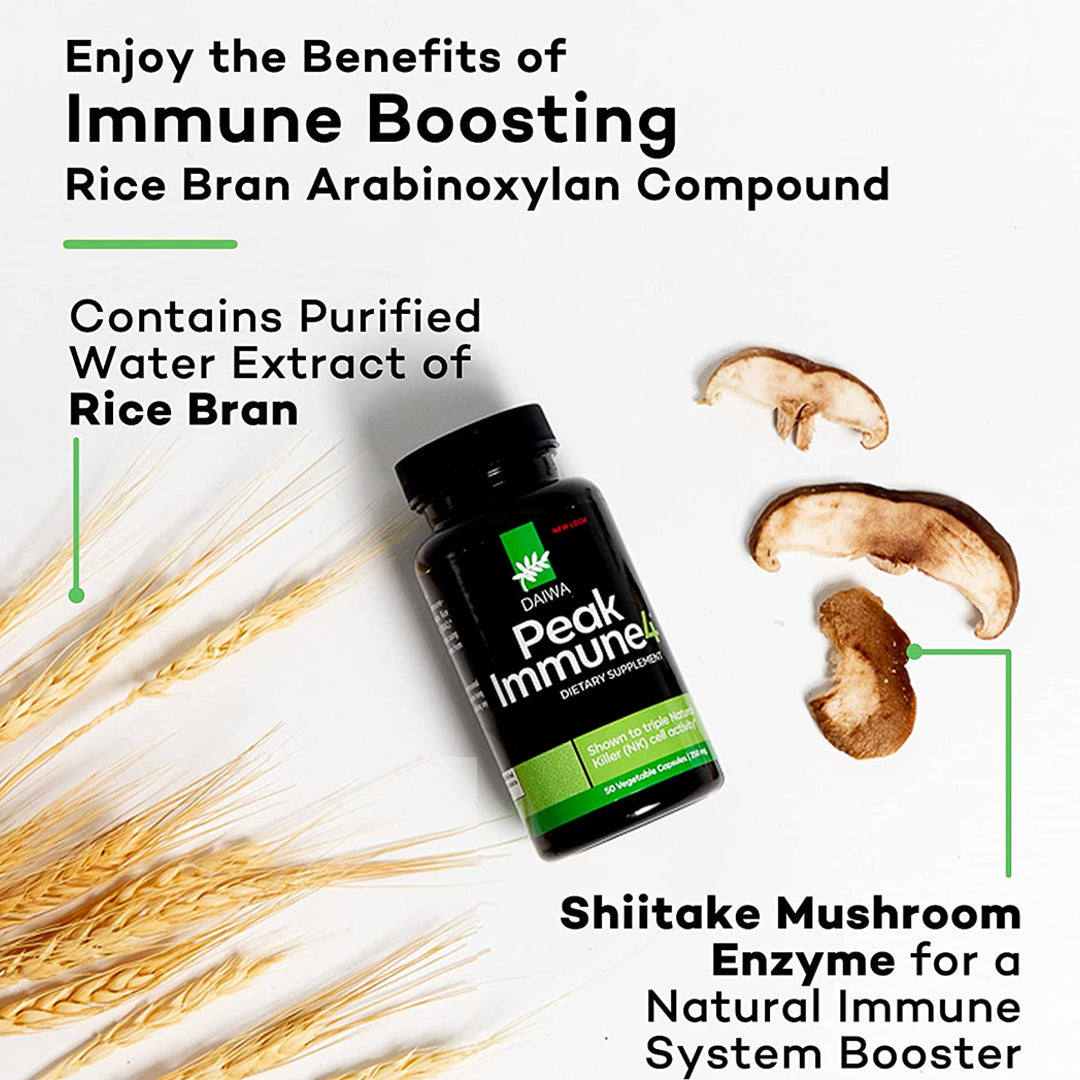More and more studies are pointing to krill oil as being a superior alternative to fish oil.
Both are excellent sources of omega-3 fatty acids, eicosapentaenoic acid (EPA) and docosahexaenoic acid (DHA).
However, the omega-3 fatty acids in krill oil are present in the form of phospholipids instead of triglycerides as seen in fish oil.
Studies suggest that krill oil omega-3 fatty acids are more easily transported through the body because cell membranes are made up mostly of phospholipids.
This delivery method may explain the higher bioavailability of krill oil compared to fish oil.
The concentration of EPA and DHA in the blood was found to be higher among those taking krill oil over those taking the same amount of EPA and DHA from fish oil.
When comparing krill oil capsules to fish oil supplements, research suggests that krill oil can result in higher DHA concentrations and blood levels of omega-3s, indicating potentially greater absorption.
This release through phospholipids allows for better absorption of omega-3 fatty acids in organs where they are needed the most, specifically the heart, brain and liver.
Omega-3 fatty acids from krill oil are better able to regulate blood lipids compared to fish oil.
Studies have shown that krill oil can lead to a significant reduction in total cholesterol, LDL and triglycerides more effectively than fish oil.
Regulation of blood lipids, including LDL cholesterol and low density lipoprotein, lowers the risk for cardiovascular issues and promotes heart health.
Krill oil is also beneficial for brain health.
A randomized, 12-week supplementation trial of elderly volunteers showed that krill oil is better able to improve cognitive function compared to those taking fish oil.
This elevation in mental functioning may be attributed to the phospholipids in krill oil that help facilitate passage through the blood-brain barrier.
Krill oil capsules are a common supplement form, and studies compare their absorption and efficacy to fish oil supplements, with some evidence suggesting differences in how each form affects blood levels of EPA and DHA.
Krill oil can manage inflammation as evidenced by reduced levels of the inflammatory marker, C-reactive protein, in a randomized trial of subjects taking krill oil compared to placebo.
An in vitro study of intestinal cells also showed decreased inflammation when exposed to krill oil. Arthritic symptoms such as knee pain have also been reported to improve with intake of krill oil.
In terms of cardiovascular health, omega-3s from krill oil supplements and fish oils may help support overall heart health.
When considering the benefits of krill oil and fish oil, research suggests both may offer the same benefits for some health outcomes, but further research is needed to confirm these findings and clarify any differences in efficacy.
In addition, fish oil's health benefits, such as supporting heart and brain health, are often compared to those of krill oil, with some studies suggesting similar or complementary effects.
For those seeking omega-3s from dietary sources, eating fish—especially oily fish like salmon, sardines, and mackerel—remains a valuable way to obtain these nutrients.
Whole foods like fish provide not only omega-3s but also other nutrients that supplements may lack, making them an important part of a balanced diet.
Oils such as fish oils, krill oil, algal oil, and plant-based oils like flaxseed and evening primrose oil each have different omega-3 profiles and can be considered based on dietary preferences and needs.
For individuals who do not consume animal products, plant-based alternatives like flaxseed oil and algal oil are available.
Flaxseed oil is rich in alpha linolenic acid (ALA), a precursor to EPA and DHA, while algal oil provides a direct plant-based source of EPA and DHA, making it suitable for vegetarians and vegans.
When using omega-3 supplements, it is important to be aware of potential blood thinning effects, as high doses of fish oil or krill oil can interact negatively with blood thinning medications.
Consulting a healthcare provider is recommended, especially for those on anticoagulants. The National Center for Complementary and Integrative Health provides authoritative guidance on omega-3 supplements and emphasizes the importance of complementary and integrative health and integrative health approaches when considering supplementation.
Krill also play a crucial role in marine life, serving as a foundational species in ocean ecosystems and supporting the food chain for many marine animals.
Some individuals may experience side effects from omega-3 supplements.
A fishy aftertaste is a common complaint with fish oil supplements, whereas krill oil is often marketed as lacking this aftertaste, making it a preferred option for those sensitive to flavor.
Introduction to Omega-3 Supplements
Omega-3 supplements, such as fish oil and krill oil, have become increasingly popular for their potential to support overall health, particularly in areas like heart health and inflammation management.
These oil supplements are rich in two essential fatty acids: eicosapentaenoic acid (EPA) and docosahexaenoic acid (DHA). Both EPA and DHA are types of omega 3 fatty acids that the body cannot produce in sufficient amounts, making dietary supplements or increased fish intake important for many individuals.
Fish oil supplements are typically derived from cold water fatty fish like salmon, mackerel, and sardines, while krill oil is extracted from tiny, shrimp-like crustaceans found in the ocean.
Although both fish oil and krill oil provide EPA and DHA, they differ in their chemical structure, which can influence how well the body absorbs these essential fatty acids. This difference in absorption may impact the effectiveness of each supplement in delivering health benefits.
The health benefits of omega-3 fatty acids are well-documented in clinical nutrition research. Omega 3s are known to help manage inflammation, which can be beneficial for individuals with rheumatoid arthritis and similar conditions.
Additionally, evidence suggests that omega-3s can benefit heart health by lowering triglyceride levels, supporting healthy blood pressure, and reducing the risk of blood clotting—factors that are important for cardiovascular health.
However, more research is needed to fully understand the long-term effects of both krill oil and fish oil supplements on cardiovascular issues and other health outcomes.
When deciding between krill oil and fish oil supplements, it is important to consider factors such as the concentration of EPA and DHA, potential interactions with blood thinning medications, and individual health needs.
Krill oil may offer enhanced absorption and additional antioxidant benefits, while fish oil supplements are generally cheaper and more widely available.
Individuals with a seafood allergy or those taking blood thinners should consult a healthcare professional before starting any marine oil supplement.
Ultimately, both krill oil and fish oil can be valuable additions to a balanced diet, especially for those who do not regularly consume fatty fish or other sources of omega-3s.
By understanding the differences and potential benefits of each supplement, and seeking guidance from a healthcare provider, individuals can make informed choices to support their cardiovascular health and overall well-being.
Choline
Krill oil has choline, a compound essential for cellular structure and function as well as various metabolic processes in the body.
Although choline can be produced endogenously, dietary supplements may be necessary to meet the body’s daily requirements.
A study by Aker Biomarine using Superba™ Boost krill oil supplementation resulted in increased levels of choline metabolites necessary to produce amino acids and other biochemical reactions.
Antioxidant astaxanthin
A unique advantage of krill oil is that it contains the antioxidant astaxanthin, which sets it apart from other omega-3 sources.
Krill oil is rich in an antioxidant called astaxanthin, which not only helps protect krill oil from oxidation but also offers potential cardiovascular and inflammation management benefits.
Astaxanthin acts like a natural preservative by protecting the omega-3 fatty acids in krill oil from oxidative damage.
It is lipid-soluble so it is more easily absorbed through the cell membrane.
It has been reported to protect the skin by reducing water loss and supporting collagen resulting in smoother, younger looking skin.
Its structure allows for easier transport so that it is able to exert its antioxidant activity in all areas of the body even in the brain where it is able to cross the blood-brain barrier.
This information is intended for educational purposes only.
These statements have not been evaluated by the Food and Drug Administration (FDA).
Our products and or articles are not intended to diagnose, treat, cure, or prevent any disease.
Daiwa Health Development does not provide medical advice, diagnosis, or treatment.
Sources:
Bunea, Ruxandra, et al. “Evaluation of the Effects of Neptune Krill Oil on the Clinical Course of Hyperlipidemia.” Alternative Medicine Review, vol. 9, no. 4, Dec. 2004, pp. 420–428.
Cicero, Arrigo F.g., et al. “Lipid-Lowering and Anti-Inflammatory Effects of Omega 3 Ethyl Esters and Krill Oil: a Randomized, Cross-over, Clinical Trial.” Archives of Medical Science, vol. 12, no. 3, 1 June 2016, pp. 507–512., doi:10.5114/aoms.2016.59923.
Costanzo, Manuela, et al. “Krill Oil Reduces Intestinal Inflammation by Improving Epithelial Integrity and Impairing Adherent-Invasive Escherichia Coli Pathogenicity.” Digestive and Liver Disease, vol. 48, no. 1, Jan. 2016, pp. 34–42., doi:10.1016/j.dld.2015.09.012.
Deinema, Laura A., et al. “A Randomized, Double-Masked, Placebo-Controlled Clinical Trial of Two Forms of Omega-3 Supplements for Treating Dry Eye Disease.” Ophthalmology, vol. 124, no. 1, 2017, pp. 43–52., doi:10.1016/j.ophtha.2016.09.023.
Deutsch, Luisa. “Evaluation of the Effect of Neptune Krill Oil on Chronic Inflammation and Arthritic Symptoms.” Journal of the American College of Nutrition, vol. 26, no. 1, Feb. 2007, pp. 39–48., doi:10.1080/07315724.2007.10719584.
Konagai, Chizuru, et al. “Effects of Krill Oil Containing n-3 Polyunsaturated Fatty Acids in Phospholipid Form on Human Brain Function: a Randomized Controlled Trial in Healthy Elderly Volunteers.” Clinical Interventions in Aging, vol. 8, 19 Sept. 2013, pp. 1247–1257., doi:10.2147/cia.s50349.








Leave a comment
All comments are moderated before being published.
This site is protected by hCaptcha and the hCaptcha Privacy Policy and Terms of Service apply.